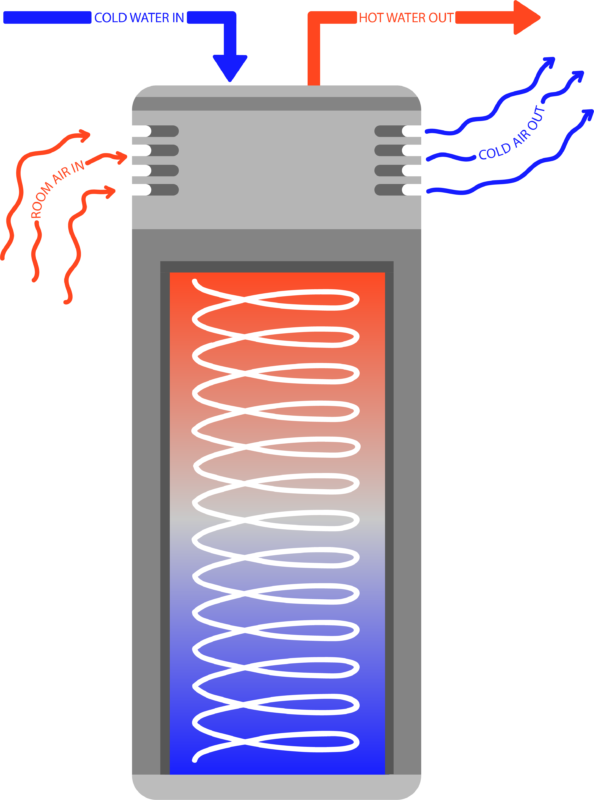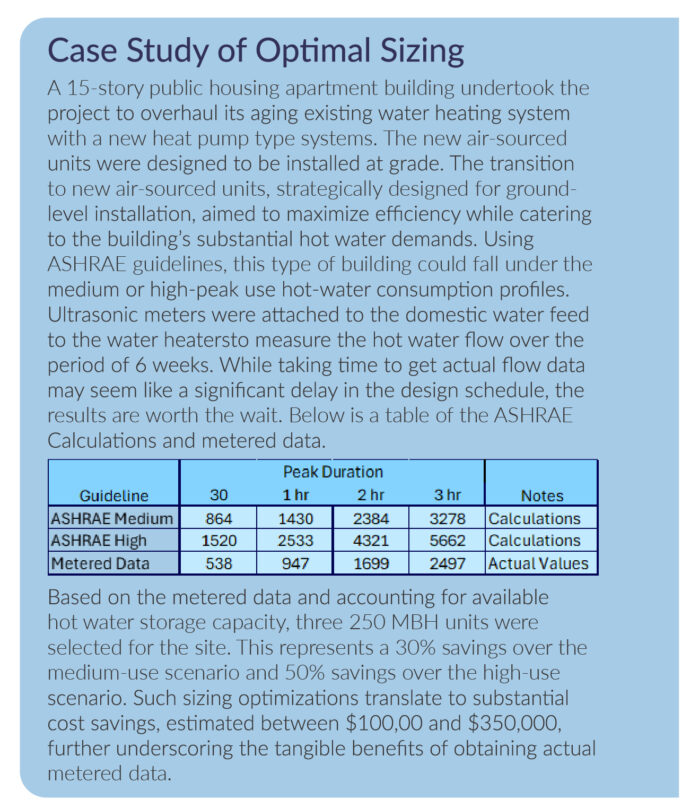Unlocking Efficiency: The Rise of Heat Pump Water Heaters in Building Solutions
September 5, 2024 Newsroom
Heat pump water heaters are emerging as game-changers in the realm of energy-efficient water heating, outperforming traditional electric resistive counterparts, as an alternative to fossil fuel-based water heating units. This innovative technology offers a compelling solution for both existing buildings looking to transition away from gas or oil-fired systems and new construction striving to achieve high-performance energy standards.
Harnessing Proven Technology:
Drawing from the same principals employed by heat pump air conditioning units, heat pump water heaters excel in transferring heat from the surrounding air or water sources to produce hot water for domestic use. Recent advancements in refrigerants and compressors have further optimized these units, enabling them to generate hot water at temperatures suitable for domestic application even at low ambient temperatures.
Diverse Configurations for Varied Needs:
Heat pump water heaters are available in a multitude of configurations, catering to medium to large apartment buildings and commercial settings. When selecting a unit, designers must first determine whether a water-sourced or air-sourced system is preferrable. Water-sourced units are ideal for buildings equipped with geothermal or condenser water systems operating year-round. In the absence of these systems, air-sourced solutions are an alternate option, particularly for retrofit projects.
Navigating Refrigerant Choices:
A pivotal decision in the design process revolves around the selection of refrigerant type. While 410A remains prevalent in HVAC applications and boasts familiarity among installers and maintenance personnel, its limitation become apparent as outdoor temperatures drop below freezing. When this happens, the unit is unable to produce hot water greater than 135°F. Moreover, the phasing out of 410A underscores the need for other options. Enter CO2, a more environmentally friendly refrigerant capable of maintaining 140°F output even in suboptimal conditions. However, working with CO2 necessitates specialized training due to its higher operating pressure.
Precision Sizing for Optimal Performance:
Ensuring the proper sizing of heat pump systems is paramount, given the greater installation costs associated with these units. Unlike conventional water heaters, oversizing a heat pump can significantly increase the initial installation cost and make it difficult for the client to realize payback on the investment. Therefore, meticulous attention to sizing considerations is imperative to optimize performance and reduce unnecessary expenditures.
Addressing Acoustical Concerns:
Given their operational similarity to chillers, air-sourced heat pump water heaters tend to produce elevated noise levels, often exceeding 90 decibels, about as loud as a passing subway train. Ideally situated on the building’s rooftop, these units may require acoustical treatment, especially if neighboring structures are in close proximity. In instances where rooftop installation is impractical, collaboration with an acoustical engineer becomes essential, potentially necessitating the design of custom enclosures to mitigate noise pollution near occupied spaces.
Embracing the Future of Water Heating:
In the ever-evolving landscape of building technologies, heat pump water heaters stand as beacons of innovation, offering a new pathway towards enhanced efficiency and sustainability in water heating systems. As we navigate the transition towards greener energy solutions, these remarkable units emerge as pivotal tools for architects, engineers, and developers striving to meet rigorous performance standards.
With their ability to leverage existing infrastructure to adapt to new construction paradigms, heat pump water heaters present a versatile solution for a diverse array of building types and sizes. From medium to large apartment complexes to sprawling commercial facilities, the flexibility inherent in these systems empowers designers to tailor solutions that align seamlessly with their project’s unique requirements.
Yet, alongside the promise of efficiency and adaptability come challenges to be met head-on. Selecting the appropriate refrigerant, precision sizing, and addressing the acoustical consideration are but a few of the hurdles to be overcome in harnessing the full potential of heat pump water heaters. With strategic planning, collaboration, and commitment to excellence. Collado Engineering can assist you in navigating these challenges and opportunities for innovation and progress on your next project.

